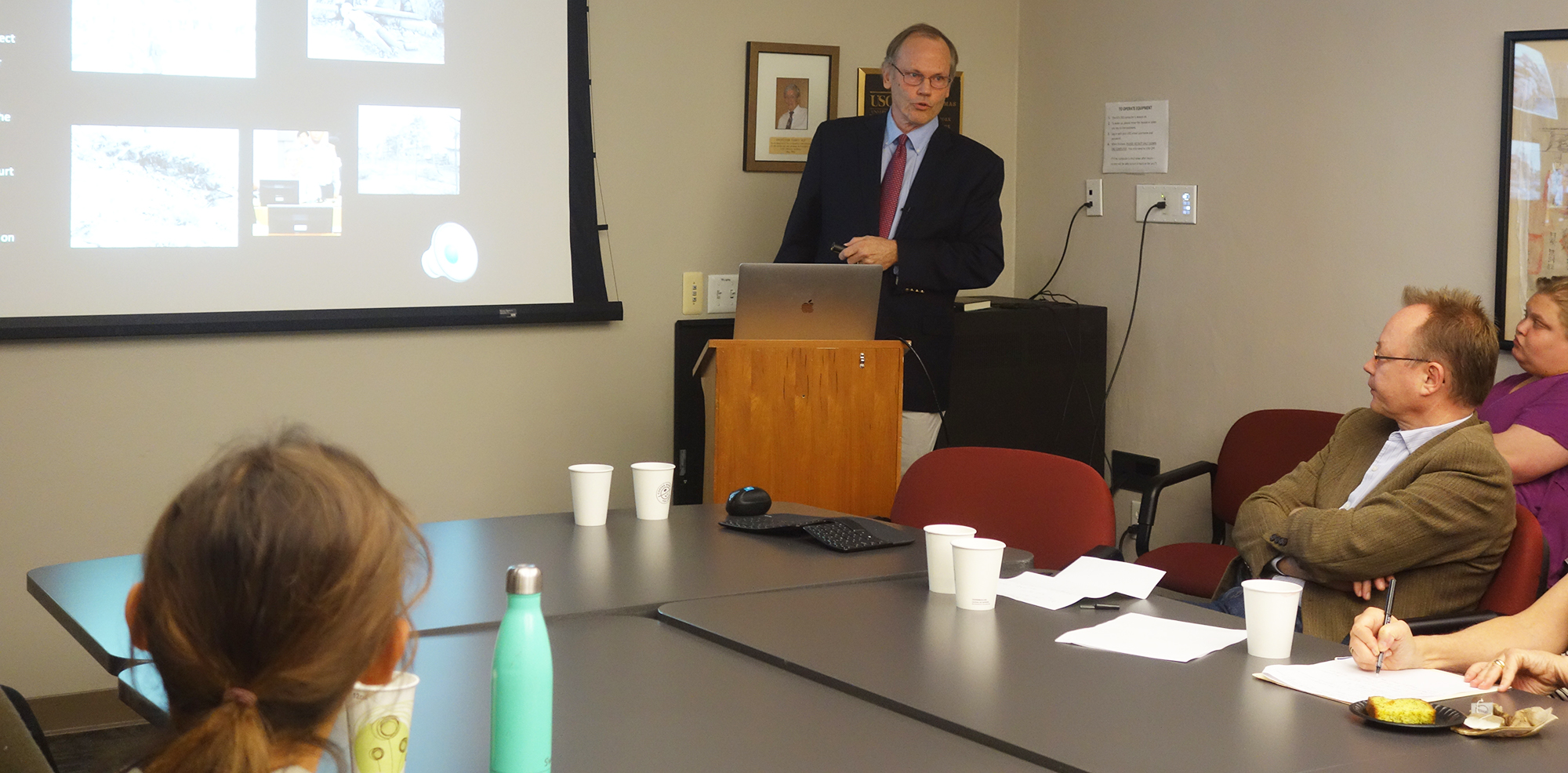Alexander Hinton Delves into Mind of Khmer Rouge Torturer in Lecture at USC

How does a beloved, brilliant math teacher turn into one of the biggest perpetrators of the Cambodian Genocide?
There is no simple answer to this question. But in his lecture at USC Shoah Foundation Center for Advanced Genocide Research on Thursday, Professor Alexander Hinton shared insights into the life trajectory of the infamous Comrade Duch, commandant of the former S-21 prison in Phnom Penh, and the lessons Duch might offer as we attempt to understand how ordinary people commit genocide.
Hinton is Director of the Center for the Study of Genocide and Human Rights and Professor of Anthropology and Global Affairs at Rutgers University, Newark. He is also a past President of the International Association of Genocide Scholars (2011-13) and holds the UNESCO Chair in Genocide Prevention. He is the author of the award-winning Why Did They Kill? Cambodia in the Shadow of Genocide and nine edited or co-edited collections.
His lecture at USC (co-sponsored by the USC Center for Visual Anthropology) focused on his new book, Man or Monster? The Trial of a Khmer Rouge Torturer, an in-depth study of Kang Kek Iew, more commonly known as Comrade Duch.
Hinton began the lecture by reading Duch’s abecedarian, an ancient poetic form in which stanzas are organized and lettered from A to Z. The poem reveals unspeakable tortures he inflicted on prisoners and his dogmatic views on party and loyalty.
But who was Duch? Hinton painted a portrait of a complicated man. Duch showed promise as a mathematician before, according to Duch, the theft of his bicycle and failed romance led to him becoming a secondary school math teacher instead of a PhD. Though his former students remembered him as a kind, devoted teacher, an inspirational teacher of his own and the arrest and torture of 10 of his students contributed to him joining the communist party and becoming a Khmer Rouge revolutionary.
Through his connections to some of the highest-ranking members of the Khmer Rouge, Duch was placed in command of the prison system that tried people accused of being traitors to the regime. The prisons were ultimately consolidated into the S-21 (Tuol Sleng) prison complex – also, ironically, a former school.
According to prison documents and signed confessions from prisoners, Duch was responsible for the torture and execution of most of the 20,000 people who passed through its doors. He urged his men to torture prisoners to “make them scared, not die” in order to get them to confess to their crimes (though most were innocent). After confession, they were clubbed to death anyway.
After the genocide, Duch fled to Thailand, converted to evangelical Christianity and lived under assumed names until he was discovered and formally charged with crimes against humanity and war crimes in 2007. After his trial before an international hybrid tribunal, he was convicted and sentenced to life imprisonment.
During the trial, which Hinton attended, Duch’s defense sought to show that he was remorseful, cooperative and that he admitted to crimes that had been documented. Indeed, he did tearfully apologize in court.
Duch and his lawyers also argued that he was only following orders, that he was merely a middleman between his subordinates and Pol Pot.
In his mind, Hinton believes, the regime was more than just a political party; it was a deity. He believed people needed to be “forged” into proper revolutionaries, that traitors needed to be completely “smashed,” and that anyone who was not pure was a suspect.
So strong was his loyalty and worship of the Khmer Rouge regime that at one point during the trial, when asked why he committed these crimes, he stood up and saluted.
“It seemed almost as if it were yesterday,” Hinton said. “He wanted to save the country, that was why he said he became a revolutionary.”
Hinton also offered a different perspective, based on Hannah Arendt’s idea of the “banality of evil.” Arendt believed that Holocaust perpetrators like Adolf Eichmann were simply average people who failed to think critically and who committed genocidal acts for professional gain, perhaps, but not necessarily staunch ideology.
Duch, Hinton said, demonstrates the “banality of everyday thought,” or the reductive categorization and dehumanization of other people that people engage in without thinking critically about their actions or the actions of their government. From such thoughtlessness, genocide becomes possible.
“Thoughtlessness happens every day,” Hinton said. “It is not exceptional.”
For more with Professor Hinton, watch the interview above.
Like this article? Get our e-newsletter.
Be the first to learn about new articles and personal stories like the one you've just read.